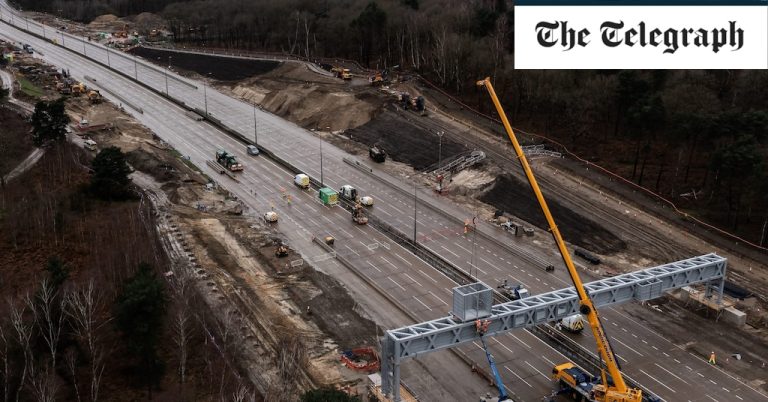The M25 in Surrey reopened last night eight hours ahead of schedule after the first planned daytime closure of the motorway.
A five-mile stretch between junctions 10 and 11 closed in both directions at 9pm on Friday and was due to open at around 6am on Monday.
However, following works to demolish a bridge and install a huge gantry, it reopened at just after 10pm on Sunday.
The National Highways South-East (NHSE) said on X, formerly Twitter: “We’d like to say a massive thank you to everyone for your patience and following our travel advice.”
The closure had prompted concerns that thousands of drivers would be stuck in gridlocked traffic over the weekend during the unprecedented closure on the south-west of the orbital route.
There had been some build-up, with congestion stretching two miles at one point, but traffic along the new route through the towns of Byfleet, West Byfleet, Woking and Ottershaw was not as bad as feared.
Drivers were told to avoid travelling over the weekend, and the advice meant traffic levels were reduced by more than 50pc compared with normal and around half an hour was added to journey times.
Amanda Boote, of Woking Borough Council, told the PA news agency: “It’s actually been as lot better than we expected, it’s not gridlocked in the way that we thought it would be.
“It was built up a bit, but no different to how it might normally be. Actually residents are quite happy, they’ve been sleeping well because it’s so quiet overnight.”
It was the first planned daytime closure of the M25 – which encircles London – since it opened in 1986.
Some locals visited the empty motorway to take selfies.
An 11.5-mile diversion route was created to direct traffic along A roads.
The M25 normally carries between 4,000 and 6,000 vehicles in each direction every hour from 10am until 9pm at weekends between junctions nine and 11.
This includes many airline passengers travelling to, from and between the UK’s two busiest airports, Heathrow and Gatwick.
Four more daytime closures of the M25 will take place up to September.
The project, due to be completed in summer 2025, will increase the number of lanes at junction 10, which is one of the UK’s busiest and most dangerous motorway junctions.
